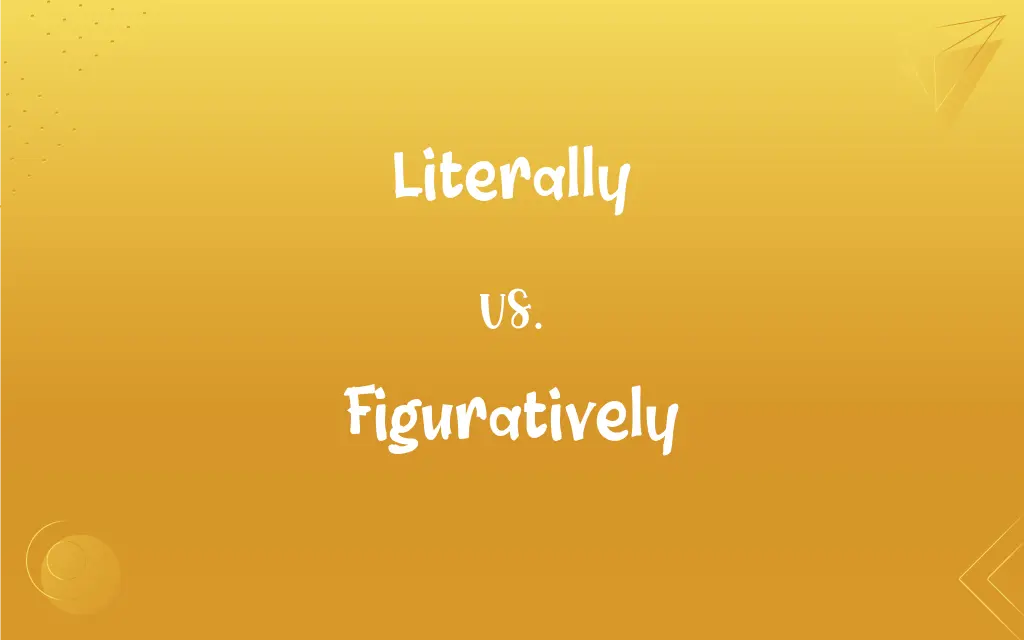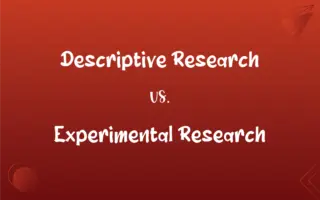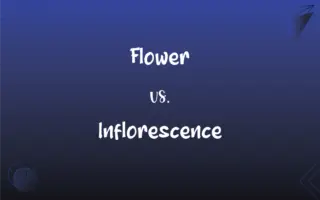Literally vs. Figuratively: What's the Difference?
Edited by Aimie Carlson || By Harlon Moss || Updated on October 22, 2023
Literally means in a strict sense or exactly as stated; figuratively means in a metaphorical sense, not literal.

Key Differences
Literally refers to something that is true in the exact sense of the word, without exaggeration or metaphor. Figuratively, conversely, emphasizes a non-literal or metaphorical interpretation, often used for dramatic effect.
When someone uses the term "literally," they're often emphasizing the truth of their statement, even if it sounds extreme. However, when "figuratively" is used, it indicates that the statement isn't to be taken at face value, but rather as an expression or figure of speech.
In modern slang, some people have begun using "literally" to intensify their statements, even when they mean "figuratively." This has led to some linguistic debates. Regardless, the traditional distinction remains: "literally" means exactly and truly, while "figuratively" suggests a symbolic or metaphorical meaning.
In literature and daily communication, "literally" might be employed to emphasize facts or real events. "Figuratively," meanwhile, enriches language by allowing for comparisons, symbolism, and creative expressions that don't adhere to strict factual representation.
Incorrect usage of "literally" can sometimes lead to humorous or absurd outcomes. Using "figuratively" in the right context ensures clarity, signaling that the statement isn't to be taken literally.
ADVERTISEMENT
Comparison Chart
Meaning
Exact, true sense.
Metaphorical, symbolic sense.
Usage
Emphasizes truth or reality.
Indicates non-literal expression.
Common in
Factual reporting.
Creative expressions.
Indicates
No exaggeration.
Exaggeration or symbolic meaning.
Example
"She literally cried for an hour."
"He broke my heart, figuratively speaking."
ADVERTISEMENT
Literally and Figuratively Definitions
Literally
Without exaggeration.
There were literally thousands of birds in the sky.
Figuratively
Not to be taken literally.
The place was a zoo, figuratively speaking.
Literally
In a strict or exact sense.
He was literally the last person to arrive.
Figuratively
Used to describe symbolic expressions.
He was figuratively drowning in paperwork.
Literally
In a true manner or sense.
She was literally speechless after hearing the news.
Figuratively
Indicating a departure from a literal use of words.
The news figuratively set the world on fire.
Literally
Emphasizing actual facts.
The town was literally wiped off the map.
Figuratively
In a metaphorical manner.
I'm so hungry, I could figuratively eat a horse.
Literally
Precisely as described.
The car literally flew down the highway.
Figuratively
Expressing a figure of speech.
He was figuratively on top of the world.
Literally
In a literal manner; word for word
Translated the Greek passage literally.
Figuratively
Based on or making use of figures of speech; metaphorical
Figurative language.
FAQs
Can "literally" be used for emphasis?
Traditionally no, but modern slang sometimes uses it this way, even if it means "figuratively."
Why use "figuratively" in a sentence?
It clarifies that you're not speaking in a literal sense.
Can a situation be both "literally" and "figuratively" true?
Yes, e.g., "The book was literally and figuratively groundbreaking."
Is it incorrect to use "literally" in a figurative sense?
Traditionally, yes. However, colloquial usage has muddied the waters.
Does "figuratively" only relate to figures of speech?
Primarily, but it can reference any non-literal representation.
Are there alternatives to using "figuratively"?
Yes, like "metaphorically," "symbolically," or "in a manner of speaking."
Do all English speakers understand "literally" in its colloquial sense?
Many do, but it's not universal, so clarity is key.
Can using "literally" incorrectly lead to misunderstandings?
Yes, especially if the context doesn't make the intended meaning clear.
Why is there confusion between "literally" and "figuratively"?
Modern slang uses "literally" for emphasis, even when it's figurative.
Do other languages have similar issues with "literally" and "figuratively"?
Many languages have words for literal and figurative, but the specific issues might differ.
Is "literally" used differently in British and American English?
The traditional meanings are the same, but colloquial uses might vary.
Should I avoid using "literally" for emphasis?
To prevent confusion, it's best to use it in its traditional sense.
What's the harm in misusing "literally"?
It can lead to ambiguity, confusion, or even humorous interpretations.
How can I remember the difference between "literally" and "figuratively"?
"Literally" means exactly as stated; "figuratively" involves symbolic or metaphorical meaning.
Why do people use "literally" when they mean "figuratively"?
Often, it's for added emphasis or due to the influence of colloquial speech.
Are dictionaries updating the definition of "literally"?
Some dictionaries include the colloquial use as a secondary definition.
Is "literally" overused?
Some believe it is, especially in its non-traditional sense.
Are "literally" and "figuratively" opposites?
Yes, "literally" refers to the exact truth, while "figuratively" means metaphorically.
Is using "literally" in a figurative sense a recent trend?
It's become more prominent recently, but there are instances from over a century ago.
Can "figuratively" be used in formal writing?
Yes, when indicating a statement isn't to be taken at face value.
About Author
Written by
Harlon MossHarlon is a seasoned quality moderator and accomplished content writer for Difference Wiki. An alumnus of the prestigious University of California, he earned his degree in Computer Science. Leveraging his academic background, Harlon brings a meticulous and informed perspective to his work, ensuring content accuracy and excellence.
Edited by
Aimie CarlsonAimie Carlson, holding a master's degree in English literature, is a fervent English language enthusiast. She lends her writing talents to Difference Wiki, a prominent website that specializes in comparisons, offering readers insightful analyses that both captivate and inform.































































